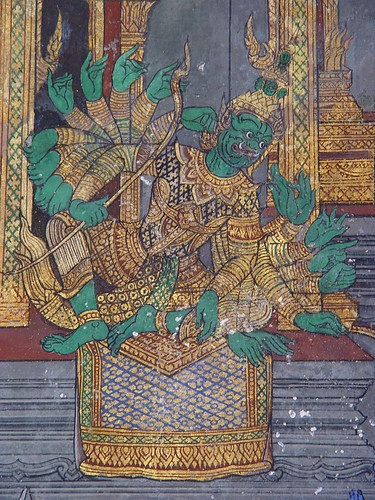
One of the great classics of Lao literature is the Phra Lak Phra Lam, an adaptation of the Indian epic, the Ramayana. I admit, for a long time, I hadn't looked too closely at it because the reputation of the Ramayana as a long-winded, convoluted bit of storytelling made it quite daunting to consider.

But this weekend I finally had a chance to read it, at least in an English translation, thanks to the great Center for Southeast Studies at Northern Illinois University, and it was quite fun.
I AM glad I put it off until now because I can appreciate more of the structure and decisions that were made in comparison to the Indian, Thai and Khmer versions of the story.
What's intriguing to me is how the Phra Lak Phra Lam blends an origin of the Lao nation with a jataka, or story of the previous life of the Buddha. It's also interesting to see which side stories are given greater emphasis compared to other variations.
A notable departure I've noticed so far is the how the monkey son of Phra Lam is handled, especially in regards to courting the mermaid princess, who is the daughter of the King of the Nak.

Perhaps it's just my own sensibilities, but I find that as serious as the subject matter is, being a sacred jataka to our culture, there's a fantastic absurdity to many elements of the story that should be met with great humor and imagination. I found myself laughing out loud frequently.

And I remain affirmed in my sense that all Lao literature should really try to be both fun and deep, honest about the quirks and failings of living beings and the contradictions we find ourselves entangled in.
There's a phrase the fantasy writer Neil Gaiman once wrote that suggested that all stories eventually return to their true form. This was a particular swipe at the neutering and sanitizing of many classic fairy and folktales in Europe and America. And I can see some arguing it would be better if the Phra Lak Phra Lam had stayed closer to the Indian version, but I disagree.

To me, Phra Lak Phra Lam provides a unique glimpse into our culture and where we place our priorities, what it suggests about what we found boring and what we found exciting. It's very telling and provides intriguing insights. The tale of Khoun Bolom is probably more helpful for specific Lao customs and ideals, but I feel all of these should be read and even spoken aloud together, along with the other great folktales and legends of old.
No comments:
Post a Comment